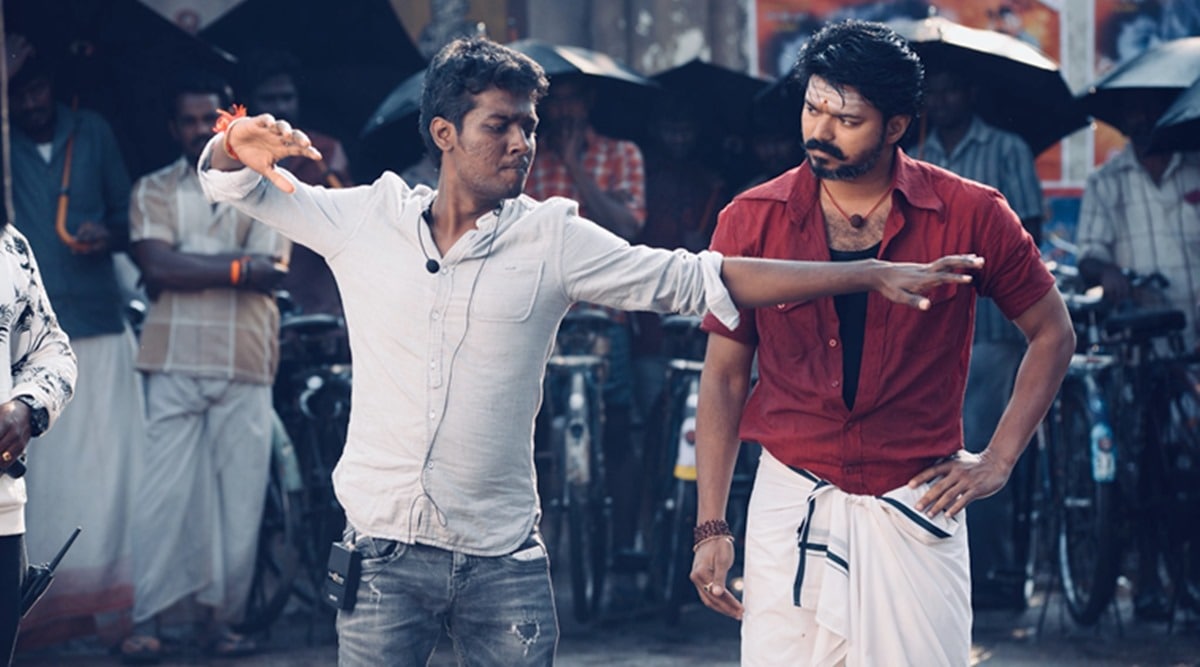
[ad_1]
 Atlee and Vijay on the sets of Mersal. (Photo: Twitter/Atlee_dir)
Atlee and Vijay on the sets of Mersal. (Photo: Twitter/Atlee_dir)
A good film should age like a bottle of fine wine. It should assume more significance, meaning and further improve your taste in cinema as it grows older. But, this is not a quality that one would find in movies made by Atlee so far.
Atlee, who is celebrating his 34th birthday today, has written and directed four movies to date. Among them, Theri, Mersal and Bigil, featuring Vijay in the lead role, have found a place in the list of movies that are not worth revisiting.
Why is that?
Atlee’s directorial debut Raja Rani is not a great movie either. But, if you decide to re-watch it, most likely, you won’t cringe. The movie is about a couple trying to adjust to the marriage that was arranged by their parents. It is particularly very difficult when both have a dead lover in the past. Atlee gets so many things right about this movie. Especially the flashback portions involving Jai and Nazriya Nazim. Jai’s performance draws some genuine laughs, and you feel the pinch in the heart when Nazriya’s character unexpectedly dies in a road accident. Also, the stretch where Arya and Nayanthara’s characters try to reconcile and make the marriage work is equally engaging. And nobody saw the climax twist.
Take, for example, Jai’s Surya. He is extremely docile and won’t even put up a fight for the things he craves. Atlee establishes the character’s unassertive personality when Nayanthara’s Regina James reduces him to tears in a rib-tickling confrontation. And Surya’s inability to stand up for himself is what later destroys his relationship with Regina. In Raja Rani, Atlee wanted to tell a story, and he did it in a way that worked both on a logical and emotional level. In the following movies (Theri, Mersal and Bigil), the qualities that made Atlee a promising filmmaker disappeared into thin air without a trace.
Atlee seemingly stopped telling stories. What he did with Theri, Mersal and Bigil is he tried to sequence in bits and pieces of what resembled a story between the build-up scenes that he tailored for die-hard Vijay fans. The development of character, plotlines and other fundamental requirements of film narration took a back-seat. He merely wanted to exploit the huge opening that came with Vijay’s stardom and ensure that his movies had enough whistle-worthy moments so that viewers can go home with the satisfaction of having got their money’s worth.
Some of the best inspirational speeches from the movies are delivered inside dressing rooms. For example, Al Pacino’s ‘inch by inch’ monologue from Any Given Sunday. If you are feeling gloomy, you can stream that rewarding dressing-room speech, and suddenly you find the motivation to keep on fighting. Back home, we have the ‘Sattar Minute’ monologue of Shah Rukh Khan from Chak De! India. The dialogue fills you with inspiration to fight your battles with everything you have so that you don’t have any regrets when it’s over.
Now, remember the dressing room scene in Bigil. It’s half time, and Michael’s (Vijay) team is trailing by 3 points. And as the team’s coach, now Michael has to burst into the dressing room and fire up his team, so that they can snatch the victory from the jaws of defeat. Atlee, however, staged the scene differently. Instead of making the scene inspirational, he makes the scene curt and rude. Michael body-shames a girl and asks another girl to quit playing football and get married. The scene is lazy and exposes Atlee’s inability to do something original. Or write an honest scene that speaks to the audience.
Theri, Mersal and Bigil all suffer from an advanced stage of unoriginality. And when you watch them again, you may wonder how come you applauded these movies when you saw them the first time.
📣 The Indian Express is now on Telegram. Click here to join our channel (@indianexpress) and stay updated with the latest headlines
For all the latest Entertainment News, download Indian Express App.
© IE Online Media Services Pvt Ltd
[ad_2]
Source link